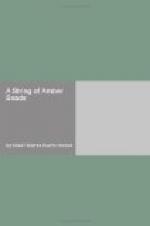left of nature’s brilliant tints, not even so
much shadow as an artist might use to accentuate a
bird’s wing in crayon—no heaven above,
no earth beneath. The interior of a raised biscuit
could not have been more densely uniform than the
atmosphere. It seemed as if the world had slipped
its moorings and drifted off its course into companionless
space, leaving me behind, as an ocean steamer sometimes
leaves a straggler on an uninhabited shore.
I felt like sending forth a call that should give
my bearings and bring back a boat to the rescue.
I groped my way down the steps, and, following an
intuition, sought the station. Ahead of me I
heard muffled steps, yet saw no form. But suddenly
a doorway opened in the east and out strode the sun.
In the air above and about me, behold, the wonder
of diamond domes and slender minarets traced in pearl!
The wayside banks were fringed with crystal spray
of downbeaten weed and bush that sparkled like the
billows of a sunlit sea. The tall elms here
and there towered like the masts of returning ships,
slow sailing from a wintry voyage back to summer lands
and splendor. There was no sound in all the air,
but the whole universe seemed singing as when the
morning stars chorused the glory of God. More
and more widely opened that doorway in the east; step
by step advanced the great magician, and over all
the world the splendor grew, until it seemed too much
for mortal eyes to bear, when lo! a touch dispelled
it all and commonplace day stood revealed.
VI.
The circling year—A clock.
The circling year is a clock whereon nature writes
the hours in blossoms. First come the wind flowers
and the violets, they denote the early morning hours
and are quickly passed. The forenoon is marked
by lilacs, apple blooms and roses. The day’s
meridian is reached with lilies, red carnations, and
the dusky splendor of pansies and passion flowers.
Then come the languid poppy and the prim little 4
o’clock, the marigold, the sweet pea, and later
the dahlia and the many-tinted chrysanthemum to mark
the day’s decline. Lastly the goldenrod,
the aster and the gentian, tell us it is evening time,
and night and frost are close at hand. The rose
hour has struck already for ’93. The garden
beds are full of scattered petals and the dusty roadways
glimmer with ghostly blossoms too wan to be roses,
and wafted by a breath into nothingness. With
such a calendar to mark the advance of decay and death
the seasons differ from the mortal race which substitutes
aches and pains for a horologe of flowers, and grows
old by processes of physical failure and mental blight.
VII.
Something better than surface
manners.




